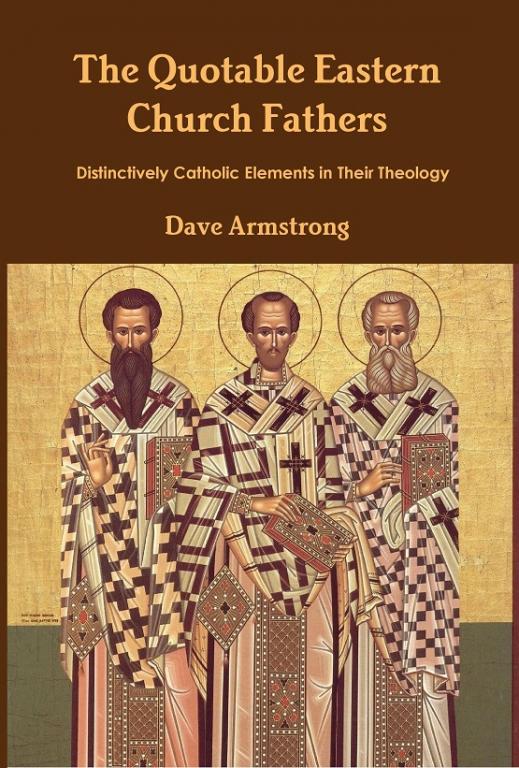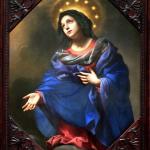. . . Observed in the Views of John of Damascus (aka John Damascene: c. 676-749)

[book and purchase information]
“Turretinfan”: a rabid anti-Catholic just as James White is, posted the following article on James White’s blog: “Did Hippo, Carthage, or Rome’s Bishop Settle the Canon?” (8-25-09). It has a number of glaring falsehoods. We can assume that James White endorses his thinking, since he hosted this article. Turretinfan’s words will be in blue.
***
Some Roman Catholics are under the false impression that the councils of Hippo (A.D. 393) and/or Carthage (A.D. 397) authoritatively settled the canon of Scripture for the church – either directly or by endorsement by one or more Roman bishops. To be deep in history, however, is to cease to be so naive.
Right. Well, it ain’t just us saying this, but reputable Protestant scholarship as well:
Pope Innocent I concurred with and sanctioned the canonical ruling of the councils (in 393 and 397) of Hippo and Carthage (Letter to Exsuperius, Bishop of Toulouse) in 405. He also reiterated this in 414. Carthage and Hippo were preceded by a Roman Council (382) of identical opinion, and were further ratified by Pope Gelasius I in 495, as well as the 6th Council of Carthage in 419.
The Protestant reference work, Oxford Dictionary of the Christian Church (2nd edition, edited by F. L. Cross & E. A. Livingstone, Oxford University Press, 1983, 232) states:
- A council probably held at Rome in 382 under St. Damasus gave a complete list of the canonical books of both the Old Testament and the New Testament (also known as the ‘Gelasian Decree’ because it was reproduced by Gelasius in 495), which is identical with the list given at Trent.
The list from 382 — which The Oxford Dictionary of the Christian Church deemed as “identical with the list given at Trent” includes: Wisdom, Ecclesiasticus, Tobit, Judith, and 1 and 2 Maccabees. Baruch was included as part of Jeremiah, as in St. Athanasius’ list of 15 years previously. This is indeed identical with the Tridentine list, and comprises the seven “extra” deuterocanonical books in Catholic Bibles which Protestants reject from the canon as “apocryphal.” Nevertheless, there they are in the Council of 382.
The Council of Carthage accepted the same list, as detailed by Brooke Foss Westcott (A General Survey of the History of the Canon of the New Testament, Grand Rapids, Michigan Baker Book House, 1980, reprinted from 6th edition of 1889, 440).
How is that for being “deep in history”?
Turretinfan then notes that John of Damascus accepted the 27 New Testament books but also included the epistles of Clement (thus, that there was supposedly “not a “catholic” (universal) canon of the New Testament even as late as the 8th century”). But in Catholic teaching, individual Church fathers are not infallible.
This is why we have always appealed to councils and papal decrees, to determine what was and is officially held by the Church. Since the biblical canon is never listed in the Bible, this is truly a matter solely for the Church and apostolic tradition (which is a perpetual serious internal difficulty and conundrum for Protestants).
Turretinfan then sums up John of Damascus’ view of the Old Testament canon:
You will notice that this is just the same (if we understand his “two books of Esdra” to refer to Ezra and Nehemiah, which seems probable and if we further assume that Lamentations is viewed as a part of Jeremiah, which is also probable) as our canon of the Old Testament, including the relegation of Wisdom and Sirach to a lesser status (useful, but not inspired).
In other words, he tries to force-fit John of Damascus’ canonical views into the Protestant model (which removed seven books from Scripture: the deuterocanon). Nice try, but no cigar. Turretinfan cites An Exact Exposition of the Orthodox Faith from John of Damascus. In the same work, the Church father cites 2 Maccabees with regard to the characteristics of God, and cites Baruch and Wisdom as “Scripture”:
He is all-seeing [2 Maccabees 10:5]: for nothing can escape Him, and over all He keepeth watch. (An Exact Exposition of the Orthodox Faith, I, 9; NPNF2-9)
[I]t is to be observed that the holy Scripture often uses the past tense instead of the future, as for example here: Thereafter He was seen upon the earth and dwelt among men. [Baruch 3:38] (Ibid., IV, 6; NPNF2-9)
The divine Scripture likewise saith that the souls of the just are in God’s hand [Wisdom 3:1] and death cannot lay hold of them. (Ibid., IV, 17; NPNF2-9)
Turretinfan cites the same work again, demonstrating that “John of Damascus (iconophile though he may have been) shares a very high view of Scripture.” Yes, of course he did, because all of the fathers did. Then he concludes:
Scriptures tell us what to believe and how to live. I would be very interested if someone wanted to try to find any comparable statement by John Damascene on oral tradition or (with still lower probability) the interpretative tradition of “the church.”
What I find interesting is that Turretinfan (a lawyer and no dummy: whatever else are his numerous faults in research and theology), seems unable to look up himself, what John of Damascus thought of tradition and the authority of the Catholic Church. He has to appeal to others to “try to find” these elements. This is truly pathetic, and in this way, he is ultra-typical of anti-Catholic Protestant polemicists, seeking to defend sola Scriptura.
They will cite only what a Church father says about Holy Scripture, and then ignore what the same father says about apostolic tradition and Church authority and apostolic succession. This is selective to the point of being either outright deceptive or extraordinarily incompetent. I’ve noted this glaring and recurring fault many many times through the years. A half-truth is little better than a lie.
For my part, I had little trouble at all locating the requested passages in John of Damascus (it was all freely available online), in compiling my book, The Quotable Eastern Church Fathers:
Neither can one expression [of a Church father] overturn the tradition of the whole Church which is spread throughout the world. (Apologia Against Those Who Decry Holy Images, I; translated by Mary H. Allies, London: Thomas Baker, 1898)
It is not in writing only that they have bequeathed to us the tradition of the Church, but also in certain unwritten examples. . . . Both are of equal value for the soul’s growth. No one will dispute this who has considered even a little the discipline of the Church. For if we neglect unwritten customs, as not having much weight we bury in oblivion the most pertinent facts connected with the Gospel. These are the great Basil’s words. How do we know the Holy place of Calvary, or the Holy Sepulchre? Does it not rest on a tradition handed down from father to son? It is written that our Lord was crucified on Calvary, and buried in a tomb, which Joseph hewed out of the rock; (Mt. 27.60) but it is unwritten tradition which identifies these spots, and does more things of the same kind. Whence come the three immersions at baptism, praying with face turned towards the east, and the tradition of the mysteries? Hence St Paul says, “Therefore, brethren, stand fast, and hold the traditions which you have learned either by word, or by our epistle.” (II Thess. 2.15) As, then, so much has been handed down in the Church, and is observed down to the present day, why disparage images? (Ibid., I)
We do not change the boundaries marked out by our fathers (Prov. 22.28): we keep the tradition we have received. If we begin to lay down the law to the Church, even in the smallest thing, the whole edifice will fall to the ground in no short time. (Ibid., II)
Many things, therefore, being handed down to the Church by unwritten tradition and kept up to the present day, why do you speak slightingly of images? The Manicheans followed a gospel according to Thomas, and you will follow that of Leo. I do not admit an emperor’s tyrannical action in domineering over the Church. The emperor has not received the power to bind and loose. I know of the Emperor Valens, a Christian in name, who persecuted the true faith, Zeno and Anastasius, Heraclius and Constantine of Sicily, and Bardaniskus, called Philip. I am not to be persuaded that the Church is set in order by imperial edicts, but by patristic traditions, written and unwritten. As the written Gospel has been preached in the whole world, so has it been an unwritten tradition in the whole world to represent in image Christ, the incarnate God, and the saints, to adore the Cross, and to pray towards the east. (Ibid., II)
Listen to me, people of all nations, men, women, and children, all of you who bear the Christian name: If any one preach to you something contrary to what the Catholic Church has received from the holy apostles and fathers and councils, and has kept down to the present day, do not heed him. Do not receive the serpent’s counsel, as Eve did, to whom it was death. If an angel or an emperor teaches you anything contrary to what you have received, shut your ears. I have refrained so far from saying, as the holy apostle said, “Let him be anathema,” (Gal. 1.8) in the hope of amendment. (Ibid., II)
So, then, in expectation of His coming we worship towards the East. But this tradition of the apostles is unwritten. For much that has been handed down to us by tradition is unwritten. . . . But this [veneration of images] is an unwritten tradition, just as is also the worshipping towards the East and the worship of the Cross, and very many other similar things. . . . Moreover that the Apostles handed down much that was unwritten, Paul, the Apostle of the Gentiles, tells us in these words: Therefore, brethren, stand fast and hold the traditions which ye have been taught of us, whether by word or by epistle. [2 Thess 2:15] And to the Corinthians he writes, Now I praise you, brethren, that ye remember me in all things, and keep the traditions as I have delivered them to you.” [1 Cor 11:2] (An Exact Exposition of the Orthodox Faith, IV, 12 and 16; NPNF2-9)
I will be glad to assist Turretinfan or James White or any other anti-Catholic (or ecumenical) Protestant anytime in the future if they have difficulty with indices, the alphabet, word-searches, Google, online books, or related aspects, in locating what a particular Church father believed on a given “Catholic” (or “Romish”) topic. Glad to be of service.
In the meantime, I highly recommend that they cease and desist in their academically dishonest method of extremely selective (virtually, cynical) citation, to the exclusion of other “Catholic” related passages in the same Church father.
***
*
My book royalties from three bestsellers in the field (published in 2003-2007) have been decreasing, as has my overall income, making it increasingly difficult to make ends meet. I provide over 2600 free articles here, for the purpose of your edification and education, and have written 50 books. It’ll literally be a struggle to survive financially until Dec. 2020, when both my wife and I will be receiving Social Security. If you cannot contribute, I ask for your prayers. Thanks! See my information on how to donate (including 100% tax-deductible donations). It’s very simple to contribute to my apostolate via PayPal, if a tax deduction is not needed (my “business name” there is called “Catholic Used Book Service,” from my old bookselling days 17 or so years ago, but send to my email: [email protected]). Another easy way to send and receive money (with a bank account or a mobile phone) is through Zelle. Again, just send to my e-mail address. May God abundantly bless you.
***













